Related Research Articles

The Church of the Lutheran Brethren of America (CLBA) is a Lutheran denomination of Christians rooted in a Pietist Lutheran spiritual awakening at the turn of the 20th century.
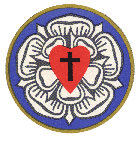
The Lutheran Church of China was a Lutheran church body in China from 1920 to 1951. It was established as a result of the consultations between the various Lutheran missionary bodies in China that was initiated during the China Centenary Missionary Conference held in Shanghai in 1907. The church survived as an organised body after the Chinese Communist Revolution but was absorbed into the state-backed Three-Self Patriotic Movement.

The Chinese Baptist Convention is a Baptist Christian denomination in Taiwan and the territories administered by the Republic of China. It is affiliated with the Asia Pacific Baptist Federation and the Baptist World Alliance. The headquarters is in Taipei.

The Taiwan Lutheran Church is one of the six Lutheran bodies in Taiwan. It currently has 80 mission sites nationwide with a total of 11,422 baptized members.
Lutheran Brethren Seminary (LBS) is an institute of theological higher education of the Church of the Lutheran Brethren of America (CLBA), located in Fergus Falls, Minnesota. It shares its campus with the denominational headquarters of the CLBA and the denomination’s high school, Hillcrest Lutheran Academy. The seminary’s primary mission is to train and equip pastors, missionaries, and Christian lay workers for ministry in the Church of the Lutheran Brethren and other church bodies.
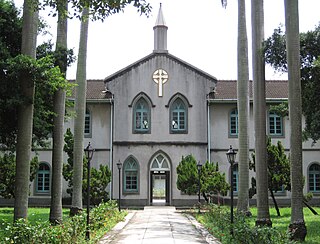
Tainan Theological College and Seminary is a private Presbyterian educational institution in Tainan, Taiwan. It is one of three Presbyterian Church in Taiwan (PCT) theological schools that trains students for ministry in the PCT, along with Taiwan Seminary and Central Taiwan Theological College and Seminary.

Asian Seminary of Christian Ministries is regional theological education and ministry training institution of the Church of God World Missions and a religious higher education institution recognized by the Philippine government.
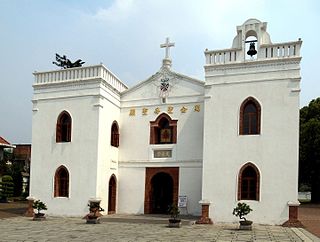
Christianity in Taiwan constituted 3.9% of the population, according to Taiwan's 2005 census. Christians on the island included approximately 600,000 Protestants, 300,000 Catholics and a small number of members of the Church of Jesus Christ of Latter-day Saints. Estimates in 2020 suggested that the portion had risen to 4% or 6%.
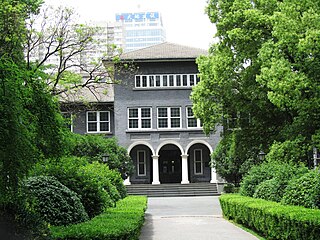
The Nanjing Union Theological Seminary is the flagship theological seminary of Protestant Christianity in China today. It is managed by the China Christian Council.
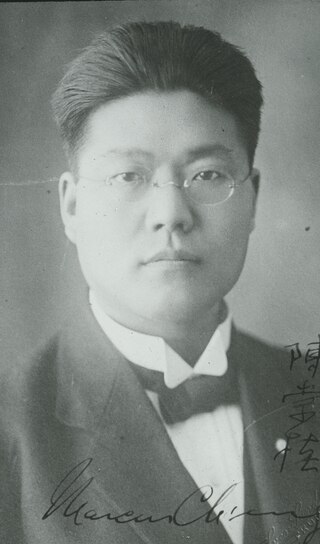
Marcus Cheng, was a leading Chinese Protestant evangelical leader. Cheng became a prominent evangelical leader and Chinese nationalist and gained international attention in the 1920s. After the establishment of the People's Republic of China in 1949, Cheng joined other Protestant leaders to form the Three-Self Patriotic Movement, which promised independence of foreign financing and control in return for religious autonomy. He became disillusioned and openly criticized the government's policies on religion in 1957. Although he was not arrested, he was severely criticized and died in obscurity in 1963.
China Evangelical Seminary is a private non-denominational, evangelical seminary. Before moving to Taoyuan City in 2019 Fall semester, its main campus was based in Taipei, Taiwan for the first 49 years.
Philosophy in Taiwan is the set of philosophical traditions in Taiwan, while Taiwanese philosophy is taken to mean philosophical work from the country. Philosophical thought in Taiwan is diverse, drawing influence from Chinese philosophy during Qing rule from the 17th and 18th century, and Western philosophy through the Kyoto School during Japanese rule in the 19th and early 20th century. Taiwanese philosophy took a more endogenous turn during the modern era, with burgeoning philosophical debate regarding Taiwanese Gemeinschaft.
Lin Shengben is a Chinese hymn composer, known for his songs composed with Chinese traditional tunes.

Alliance Bible Seminary, is a C&MA seminary, located in Cheung Chau, Hong Kong. The seminary was originally founded in 1899 in Wuzhou, Guangxi, under the name Alliance Bible College. Established by missionaries Dr. Robert Glover and Robert A. Jaffray, ABS was the first C&MA seminary to be founded overseas, and one of the first seminaries in South China. In 1949, the seminary was moved to Cheung Chau, Hong Kong by Dr. William C. Newbern after the Communist takeover of mainland China. ABS was founded before any church plant and trained many of its students for missionary work. After they graduated, most were sent to establish new churches. Hence, most churches of the Christian and Missionary Alliance in Hong Kong were planted by their graduates.
Bong Rin Ro is an American theologian and missiologist. He is a founding leader and former executive secretary of the Asia Theological Association as well as former dean of the Asia Graduate School of Theology.

Guangdong Union Theological Seminary, formerly Canton Union Theological College, is located in Guangzhou City and sponsored by the Guangdong Christian Council. It is the first provincial-level theological undergraduate college in China and the only theological seminary in Guangdong Province.
Ho Chen Tsu(賀陳詞)(1918-1994), born in Hengyang, Hunan Province, is one of the first generation of architects and important architecture educators in post-war Taiwan.
Shandong Theological Seminary is the only Christian theological college in Shandong Province of eastern China. It was founded in 1987 by the Shandong Provincial Christian Council in Jinan, the provincial capital. Since its establishment, the seminary has produced nearly 2,000 graduates for the churches of Shandong. The school also owns the "Qilu Theological Research Center", which was established in cooperation with the Chinese Academy of Social Sciences.
References
- ↑ "Overview and Vision". China Lutheran Seminary.
- ↑ Po Ho, Huang (July 3, 2012). "Select Surveys on Theological Education in Emerging Asian Churches". The Ecumenical Review. 64. doi:10.1111/j.1758-6623.2012.00161.x.
- 1 2 3 4 5 6 7 8 9 "Historical Sketch of CLS". China Lutheran Seminary.
- ↑ Hsiao, Andrew (1999). A Brief History of the Chinese Lutheran Church. Hong Kong: Taosheng Publishing. ISBN 962-380-107-6.